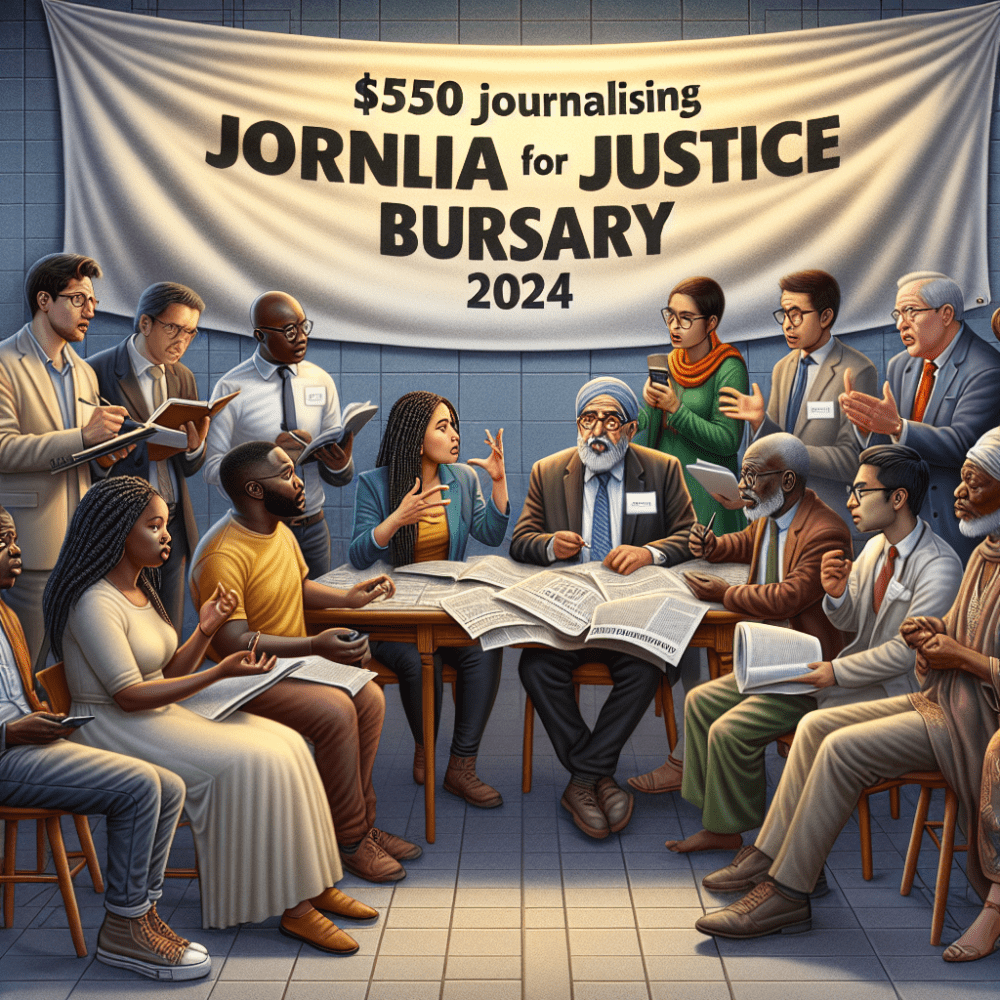Scholarship details
In 2024, aspiring journalists in South Africa have an incredible opportunity to further their careers and contribute to societal change through the $550 Journalism for Justice Bursary. This bursary is designed not only to support the financial needs of journalism students but also to encourage a focus on justice and human rights issues within the country.
Overview of the Host Organization
The Journalism for Justice Bursary is provided by Media Advocacy Group (MAG), a non-profit organization dedicated to promoting freedom of expression and media integrity in South Africa. Since its inception, MAG has been at the forefront of advocating for press freedom and providing resources for journalists who aim to cover critical issues that impact society.
MAG’s mission focuses on three core areas: training, advocacy, and support. They offer various programs that equip journalists with skills in investigative reporting, digital media literacy, and ethics in journalism. By doing so, they ensure that the next generation of journalists can uphold the standards of accurate, fair, and balanced reporting.
Insights into South Africa
South Africa is a country rich in diversity and history. Known for its stunning landscapes, vibrant cultures, and complex socio-political landscape, it offers a unique backdrop for aspiring journalists.
Historical Context
South Africa’s history is marked by its struggle against apartheid—a system of institutionalized racial segregation and discrimination that lasted from 1948 until the early 1990s. The dismantling of apartheid led to significant social changes but also left behind numerous challenges that continue to affect its citizens today. Understanding this historical context is crucial for any journalist who wishes to cover justice issues within the nation.
Cultural Diversity
The country’s cultural diversity is another significant aspect that adds depth to journalistic endeavors. With eleven official languages and multiple ethnic groups, South Africa provides a rich tapestry of stories waiting to be told. Journalists have the opportunity to explore various perspectives and highlight voices from different communities.
Current Issues
Despite its progress since apartheid ended, South Africa continues to face several pressing issues such as inequality, corruption, unemployment, and crime. These challenges provide fertile ground for investigative journalism focused on justice. The bursary aims to empower journalists who are passionate about shedding light on these critical issues.
The Importance of Journalism for Justice
Journalism plays a vital role in any democratic society by holding power accountable and giving voice to marginalized communities. In South Africa, where there are still glaring disparities between different segments of the population, journalism becomes even more critical.
Investigative Reporting
Investigative reporting can uncover corruption scandals or highlight social injustices that would otherwise remain hidden from public scrutiny. Journalists who specialize in this area can make significant contributions toward promoting transparency and accountability within both governmental bodies and private sectors.
Human Rights Reporting
Human rights reporting focuses on bringing attention to abuses or violations faced by individuals or groups within society. By doing so, it helps create awareness among citizens while also putting pressure on authorities responsible for protecting these rights.
Bursary Details
The $550 Journalism for Justice Bursary aims at supporting students currently enrolled in accredited journalism programs within South African universities or colleges.
Eligibility Criteria
To qualify:
- Applicants must be permanent residents or citizens of South Africa.
- They should be enrolled full-time at an accredited institution.
- Demonstrate academic excellence with a minimum GPA requirement (specific GPA may vary).
- Show interest or previous work related specifically to justice/human rights themes.
- Provide letters of recommendation from professors or mentors familiar with their work ethic and potential contribution to journalism focused on justice themes.
Application Process
- Application Form: Complete an online application form available on MAG’s website during specified dates.
- Personal Statement: Write an essay outlining why you’re passionate about pursuing a career focused on justice-related stories/issues.
- Portfolio Submission: Submit samples of past articles, blogs, or reports showcasing your ability to cover similar themes/topics.
- Interview Stage: Shortlisted candidates undergo an interview process conducted either face-to-face or via video conference, depending on circumstances.
- Final Selection: Successful applicants receive notification followed by an official announcement made via MAG’s website and social media platforms.
- Fund Disbursement: Funds are directly disbursed to the educational institution towards tuition fees, books, and materials required for the respective course duration.
Benefits Beyond Financial Support
While monetary aid significantly reduces the financial burden faced by many students, allowing them to focus solely on achieving academic goals, the benefits extend far beyond mere funding.
Networking Opportunities
Recipients become part of a larger community comprising like-minded individuals equally passionate about making a positive impact through storytelling. Regular events and workshops are organized where they get the chance to meet industry professionals and gain insights into trends and happenings in the field.
Skill Enhancement
Various training sessions are conducted periodically, aimed at equipping participants with the latest tools and techniques employed in modern-day reportage. Sessions cover a range of topics, including data-driven storytelling, multimedia integration, and traditional methods, ensuring the holistic development of participants.
Conclusion
The $550 Journalism for Justice Bursary presents a golden opportunity for those wishing to carve a niche for themselves in the industry while simultaneously contributing to societal change. By providing necessary resources coupled with invaluable guidance and support networks offered via Media Advocacy Group, budding journalists are equipped to tackle pressing challenges head-on, thus paving the way for a brighter future for both themselves and the broader community they serve.
Apply today and be part of the change!





















